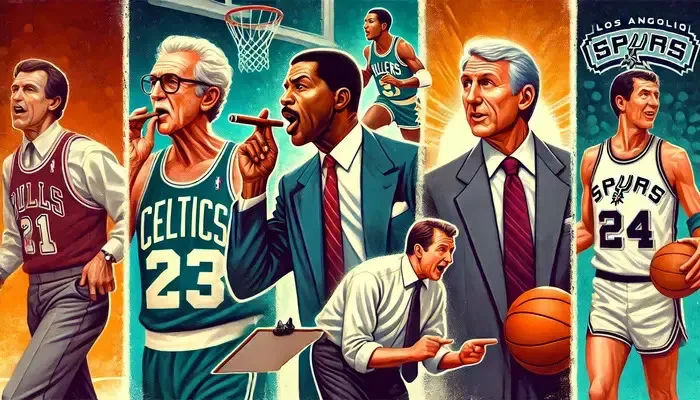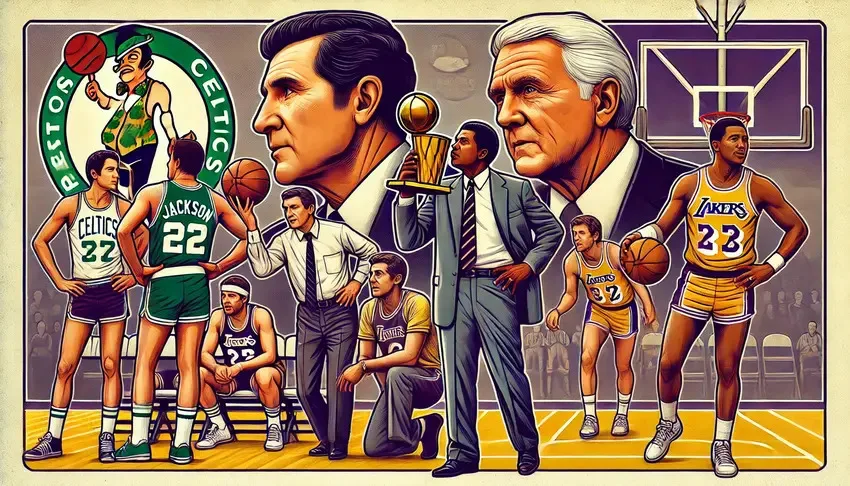Legendary Basketball Coaches: Their Methods and Philosophy

Basketball has seen numerous exceptional coaches who have left an indelible mark on the sport. These coaches not only achieved remarkable success but also influenced how the game is played and coached. This article delves into the methods and philosophies of four legendary basketball coaches: Red Auerbach, Phil Jackson, Pat Riley, and Gregg Popovich. Just as strategic thinking and preparation are crucial in basketball, they are equally important in other areas, such as in the world of online gaming, where resources like Casino Ninja offer valuable insights.
Red Auerbach
Red Auerbach, the mastermind behind the Boston Celtics’ dynasty of the 1950s and 60s, is often credited with revolutionizing basketball coaching. Auerbach’s approach was straightforward yet profound. He emphasized the importance of team play over individual brilliance. Under his guidance, the Celtics won nine NBA championships, including an unprecedented eight consecutive titles from 1959 to 1966.
Auerbach was known for his innovative strategies, such as the fast break and tenacious defense, which became hallmarks of the Celtics’ gameplay. He believed in rigorous preparation and instilling confidence in his players. His philosophy was built on respect and loyalty, creating a family-like atmosphere within the team. Auerbach’s legacy is not just in his titles but in how he shaped the culture of the Celtics, a culture that persists to this day.
Phil Jackson
Phil Jackson, known as the “Zen Master,” is one of the most successful coaches in NBA history, with 11 championships to his name. Jackson’s coaching style is a blend of psychological insight, spiritual principles, and a deep understanding of basketball tactics. He is famous for implementing the “Triangle Offense,” a system that emphasizes spacing, ball movement, and player roles, which led to the Chicago Bulls’ and Los Angeles Lakers’ dominance.
Jackson’s unique approach to coaching included incorporating elements of Zen Buddhism and Native American philosophy, aiming to create a harmonious and focused team environment. He stressed the importance of mental toughness, self-awareness, and mindfulness, helping players manage the pressures of professional sports. Jackson’s ability to manage egos and unite star-studded rosters into cohesive units is a testament to his exceptional leadership and coaching acumen.
Pat Riley
Pat Riley, with five NBA championships as a head coach, is renowned for his intense and disciplined coaching style. Riley’s philosophy centers around the concept of “The Disease of More,” a term he coined to describe the tendency for players to seek more individual accolades after experiencing success. To counter this, Riley emphasized collective effort, sacrifice, and a relentless work ethic.
Riley’s coaching career includes successful stints with the Los Angeles Lakers, New York Knicks, and Miami Heat. He is known for his meticulous preparation, defensive schemes, and ability to adapt his strategies to suit his team’s strengths. Riley’s leadership extends beyond the court; as an executive, he built the Miami Heat into a perennial contender, highlighting his comprehensive understanding of team dynamics and basketball operations.

Gregg Popovich
Gregg Popovich, the long-time head coach of the San Antonio Spurs, is celebrated for his strategic brilliance and player development. Popovich’s coaching philosophy is built on the principles of teamwork, humility, and adaptability. Under his leadership, the Spurs have won five NBA championships and are known for their consistent performance and competitive spirit.
Popovich emphasizes the importance of communication, building strong relationships with his players based on trust and respect. He is adept at recognizing and nurturing talent, often turning lesser-known players into key contributors. Popovich’s system prioritizes ball movement, unselfish play, and a commitment to defense. His ability to evolve his strategies with the changing dynamics of the game and his focus on the holistic development of his players set him apart as one of the greatest coaches in basketball history.
General Principles and Philosophies of Legendary Coaches
The common thread among these legendary coaches is their emphasis on teamwork, discipline, and adaptability. They all recognize the importance of creating a positive and cohesive team culture, where every player understands their role and contributes to the collective success. These coaches are not just tacticians but also mentors who shape the character and careers of their players.
Their philosophies extend beyond basketball, teaching lessons in leadership, resilience, and personal growth. Whether it’s Auerbach’s focus on preparation, Jackson’s mental and spiritual guidance, Riley’s demand for hard work, or Popovich’s emphasis on communication and development, each coach offers valuable insights into achieving excellence in sports and life.
In conclusion, the methods and philosophies of these legendary coaches have transcended the game of basketball. They have set standards for coaching excellence, leaving a lasting legacy that continues to inspire future generations of players and coaches. Their success is a testament to the power of vision, dedication, and the relentless pursuit of greatness.




